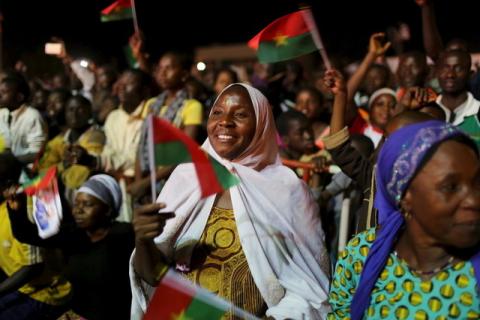Advertisement
Burkina Faso president-elect pledges to go beyond reviving economy
OUAGADOUGOU (Reuters) - Burkina Faso's president-elect, Roch Marc Kabore, promised on Tuesday to tackle "fundamental needs" such as sanitation and to revive an economy that has flagged since a popular uprising toppled his veteran predecessor 13 months ago.
Kabore served as prime minister and head of the National Assembly under Blaise Compaore, who was overthrown last year after trying to change the constitution to extend his 27 years in power.
Kabore's election on Sunday was a pivotal moment for the West African nation, whose leaders for most of its history since independence from France in 1960 came to power in coups.
"We need to organize ourselves to take in hand the whole country's preoccupations because our first objective is not simply to revive the economy but at the same time to satisfy the fundamental needs of the whole population," Kabore told Reuters after being declared the winner overnight.
"The challenges are numerous and multiple in Burkina Faso. They include education, healthcare, access to clean water and the economy," he added in an interview.
Landlocked Burkina Faso produces cotton and gold but remains impoverished. Its economy has slowed due to lower global commodity prices and reduced investment during the democratic transition that began after Compaore fell.
The finance minister has said the economy will expand by 4 to 4.5 percent this year, compared to what the World Bank says was 6 percent growth in 2014.
STREET CELEBRATIONS
Kabore split with Compaore early last year and formed the opposition Movement of People for Progress (MPP), which was made up of disaffected former allies of the president.
The fairest election in the country's history should lead to stability, but Kabore will face opposition from supporters of Compaore who consider him a traitor, said Sean Smith, West Africa analyst at management consultancy firm Verisk Maplecroft.
In his manifesto, Kabore said he would end the pillage of resources but he is unlikely to revise mining regulations in the next few years since the transitional government ratified a new mining code this year, Smith said.
Provisional results showed he won 53.5 percent of the vote to defeat former Finance Minister Zephirin Diabre, who scored 29.7 percent, and 12 other candidates. Turnout was about 60 percent.
Candidates and parties have seven days to contest the provisional figures and the constitutional court then has 15 days in which to publish definitive results. No one has yet challenged the results and Diabre has congratulated Kabore.
Crowds celebrated the result in the streets of the capital, Ouagadougou, honking car and motorbike horns.
The vote could serve as an example of democratic transition to other countries in Africa, where veteran rulers in Burundi and Congo Republic have found ways to extend their terms in office this year.
The election was pushed back from Oct. 11 because of an abortive coup in September by members of the elite presidential guard, in which transitional President Michel Kafando and his prime minister were taken hostage. Kafando will step down once the new leader is sworn in.
(Additional reporting by Nadoun Coulibaly; Writing by Matthew Mpoke Bigg; Editing by Ruth Pitchford)



















Add new comment